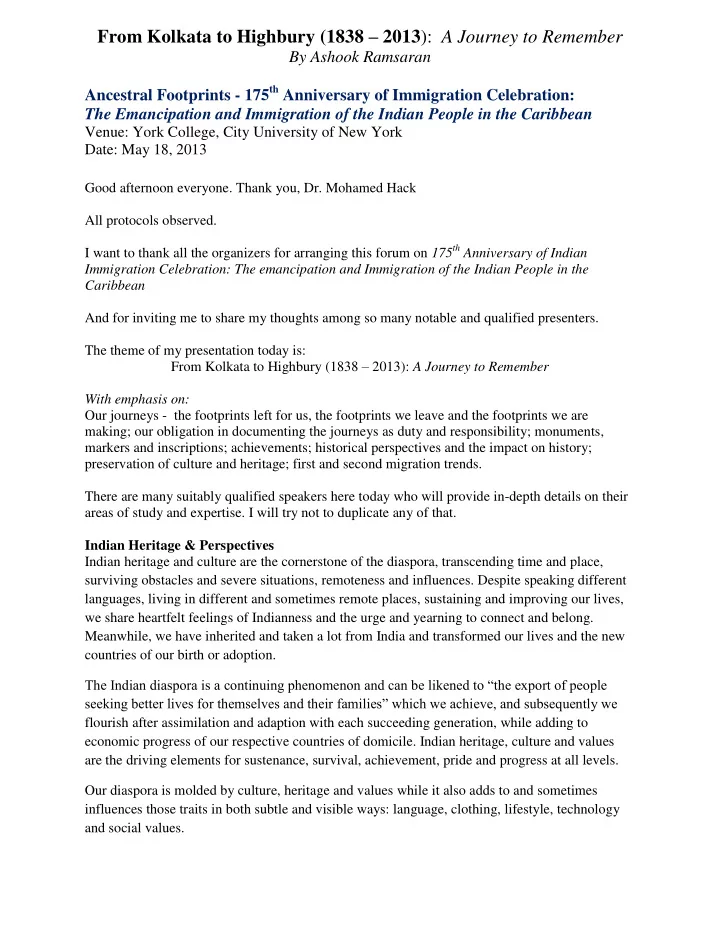

From Kolkata to Highbury (1838 – 2013 ): A Journey to Remember By Ashook Ramsaran Ancestral Footprints - 175 th Anniversary of Immigration Celebration: The Emancipation and Immigration of the Indian People in the Caribbean Venue: York College, City University of New York Date: May 18, 2013 Good afternoon everyone. Thank you, Dr. Mohamed Hack All protocols observed. I want to thank all the organizers for arranging this forum on 175 th Anniversary of Indian Immigration Celebration: The emancipation and Immigration of the Indian People in the Caribbean And for inviting me to share my thoughts among so many notable and qualified presenters. The theme of my presentation today is: From Kolkata to Highbury (1838 – 2013): A Journey to Remember With emphasis on: Our journeys - the footprints left for us, the footprints we leave and the footprints we are making; our obligation in documenting the journeys as duty and responsibility; monuments, markers and inscriptions; achievements; historical perspectives and the impact on history; preservation of culture and heritage; first and second migration trends. There are many suitably qualified speakers here today who will provide in-depth details on their areas of study and expertise. I will try not to duplicate any of that. Indian Heritage & Perspectives Indian heritage and culture are the cornerstone of the diaspora, transcending time and place, surviving obstacles and severe situations, remoteness and influences. Despite speaking different languages, living in different and sometimes remote places, sustaining and improving our lives, we share heartfelt feelings of Indianness and the urge and yearning to connect and belong. Meanwhile, we have inherited and taken a lot from India and transformed our lives and the new countries of our birth or adoption. The Indian diaspora is a continuing phenomenon and can be likened to “the export of people seeking better lives for themselves and their families” which we achieve, and subsequently we flourish after assimilation and adaption with each succeeding generation, while adding to economic progress of our respective countries of domicile. Indian heritage, culture and values are the driving elements for sustenance, survival, achievement, pride and progress at all levels. Our diaspora is molded by culture, heritage and values while it also adds to and sometimes influences those traits in both subtle and visible ways: language, clothing, lifestyle, technology and social values.
The older diaspora, which I refer to as the legacy diaspora, of the Caribbean, Africa, Mauritius and Oceania, have retained more of the Indian culture and heritage intact and in its original form for the many reasons associated with remoteness, harsh living conditions, sense of belonging and togetherness, sustenance and bonding – while some adaptation was necessary, such as with foods and clothing, some conversion to Christianity, and break down of the caste system. Later, some Indian music and songs witnessed a fusion combination such as “Caribbean Chutney”. It seems that wherever we Indians go, we take certain staples that sustain us: Mantra; Music; Massala; Memories; Mentoring; the importance of Mataji; the value of Money; and of course, thrift and hard work. Simultaneously, we have a knack for reconciling our two (2) identities – our inherent Indianness and birth or newly adopted citizenship. We learn very easily to adapt, co-exist and progress in other countries with multi-ethnic societies far away from India or the Caribbean. Indian heritage is such a powerful asset in the diaspora that some colonial powers marginalized persons of Indian origin curbing cultural observances and by making it difficult to maintain cultural traditions. Despite such efforts, those Indians persevered and sought more to preserve and protect Indian by culture, heritage and values, and survived and remained vibrant. I want to stress that adherence to heritage and cultural origin should not – and must not – diminish national loyalty. In fact, assimilation and adaption are key attributes to progressive lives in other birth or newly adopted countries. Our heritage includes “blessings as well as yokes of burdens” . These are topics for an extensive discussion. With innovation, modern communications, advanced transportation and increased levels of mobility, as well as increased opportunities in other countries, there is re-migration or second journeys. There also some repatriation to the Caribbean countries after retirement. Especially among older (legacy) diaspora, there is the yearning to find one’s roots with research and regular trips by PIOs from Caribbean, South Africa and Mauritius to find’s family and “roots”. The “Tracing our Roots” was first discussed at a session I organized at PBD20005 in Mumbai because of the need. The Kolkata Memorial, a diaspora initiative that I worked closely with Government of India to dedicate, is a beacon of acknowledgement of those who left India as indentured laborers from 1834-1920. One must acknowledge and be grateful for the indisputable and invaluable role of civic, cultural, religious and advocacy organizations in preservation of inherent culture and values – such as GOPIO of which I am privileged to be the current president. These have helped promote assimilation with ease, generally peaceful co-existence among multi-ethnic societies. GOPIO is a non-political, secular global Indian diaspora advocacy organization addressing the concerns and interests of the global Indian community. Indian heritage has undoubtedly influenced our lives and in time, we have also influenced the lives of others (non-Indians) in our midst. Visible examples include: Gadar movement spawned and encouraged others in diaspora countries in their struggle for their independence; Gandhi as model of tolerance and perseverance for those seeking peace, civil rights and equality in USA, South Africa and other countries; celebration and general acceptance of Holi and Diwali by non- Indians.
Recommend
More recommend